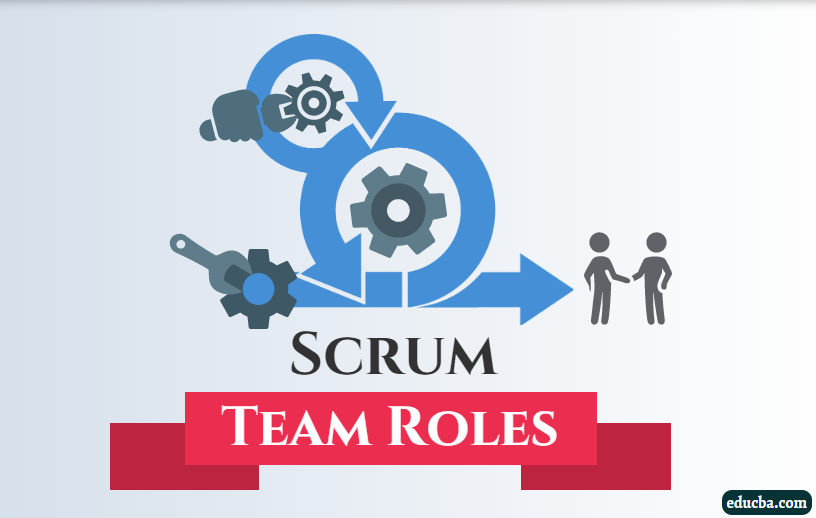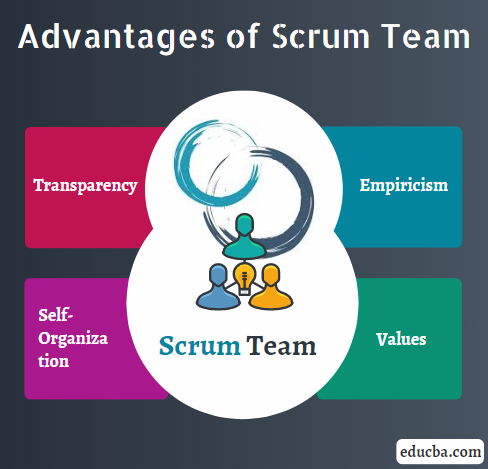Introduction to Scrum Team Roles
Scrum is a methodology related to agile management used to manage knowledge and work, especially for software development. It has wide applications in various fields and is now being explored by traditional project teams across the globe. It is made for moderately sized teams of three to a maximum of nine members, where work is broken into small chunks that can be completed within iterations called sprints. It does not take more than 30 days/a months to complete the entire work. The time taken to completely execute it is two weeks, and if it exceeds it then, it is re-structured in meetings called daily scrums. The framework that provides an image of how scrums are being implemented is called a Scrum framework. In this topic, we are going to discuss Scrum Team Roles.
Scrum Framework
The scrum framework consists of three roles. The framework in its entirety helps in optimum and proper communication among team members. These three roles together form the scrum team.
1. Product Owner
The product owner represents all the possible stakeholders and the customer in each case. It has the responsibility of delivering the maximum possible value to the customer. The product owner does not follow the traditional methods of getting things done; rather, s/he prioritizes things based on dependencies and importance. A scrum team should have only one product owner. This role is different from that of the scrum master. The product owner focuses on the business part of a product and acts as an intermediate between the stakeholders and the team. The product owner is no dictator but a consensus maker. Therefore, a good product owner should be able to understand the needs of the business, the reasons behind those needs and communicate them to the stakeholders and the concerned team.
2. Development Team
The development team is responsible for delivering optimum quality work with each passing sprint. The sprint goal describes the work a team should do and the quality it must deliver at the end of each sprint. The team has from three to nine members who carry out all tasks required to build the product increments. Although a team consists of people from various backgrounds, all of them are generally referred to as developers. It is a self-organizing team, and interactions outside the team are managed by the product owner or the scrum master.
3. Scrum Master
Scrum Master is responsible for facilitating a scrum, ensuring that there are no hassles in the way of quality products or deliverables being delivered. The scrum master acts as a mediator between the team and any hassles on the path of work and is not necessarily the team leader. The scrum master ensures that the Scrum framework is followed. In addition, the scrum master supports the improvement of a team.
Scrum Roles vs Job Titles
The three scrum roles emphasize and elaborate on the various responsibilities of a scrum in its entirety and further help execute them sincerely. They are different from job titles. This means that these roles can be performed by anyone irrespective of the job title. Empiricism, self-organization, and continuous improvement form the essence of a scrum; proper definition and accountability are given to the teams by these roles, and that allows them to deliver the given work effectively. This allows teams to organize themselves and keep improving with their work.
Advantages of Scrum Team
Given below are the advantages mentioned:
- Transparency: To be effective in everything that is being adapted and then implemented, it is very important that the right set of people are able to see it. But this is very difficult to maintain than it appears to be. It is the responsibility of the scrum master to see that transparency. For example: creating story maps and updating confluence pages with retrospective ideas.
- Empiricism: The most accurate way of planning is to first do the work then, rectify all the mistakes and finally, learn from them, a fundamental to agile approaches and proper planning. The empirical process is difficult because it needs the scrum master to explain to the scrum team how to break down work, how to explain the outcomes, and how to implement the chunks of work properly.
- Self-Organization: Asking a scrum team to self-organize means that it self-organizes itself. As a matter of fact, self-organization can be brought to order in due course of time and not on an immediate basis and on top of everything it needs help. The scrum master needs to support and ask scrum team members to go a bit off the usual track and adapt different ideas and challenge the conventional notions.
- Values: Courage, focus, commitment, respect, and openness are the five qualities defined by a scrum not because they need to be nice and perfect but for they need to make an environment that is safe and trusted. Every member of a scrum team has to follow all the rules, and it is the onus of the scrum master to remind them about it and encourage them to follow the set rules all the time.
Recommended Articles
This has been a guide to Scrum Team Roles. Here we also discuss the overview, scrum framework, and advantages of the scrum team. You can also go through our other suggested articles to learn more –




